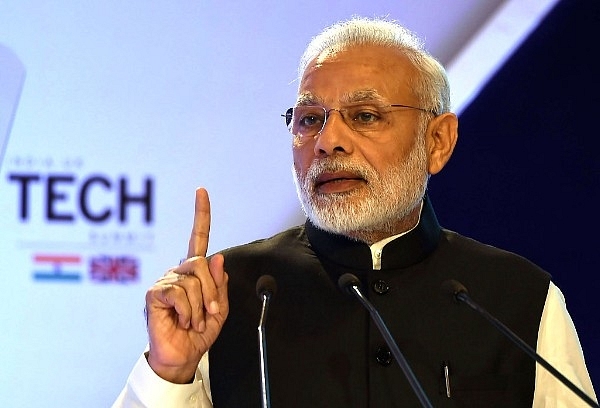Economy
Growth Slows As Companies Find It Hard To Operate In Modi’s New Laws-Based Economy
- The government’s insistence on ushering a new era of transparency in business has put a stop to the flow of easy money to corporations.

Prime Minister Narendra Modi
Growth decelerated to 5.7 per cent in the first quarter of 2017-18 fiscal year, continuing a downward trend that started six quarters ago. The fall in growth over the period has got the alarm bells ringing in the economic circles of the country.
However, an analysis by the Economist Intelligence Unit (EIU) says the growth slowdown can be explained partly as a result of initiatives launched by the Modi government and the Reserve Bank of India (RBI). “These efforts have fundamentally changed the way companies in India operate and will yield long-term benefits,” the report noted, adding that “in the short term the necessary adjustment process has led to an unusually long period of slowing growth.”
Concerted efforts of the central bank and the central government have made the public sector banks go for asset quality review, because of which the banks have been forced to disclose non-performing loans adequately in their balance sheets. This was one of the major reasons why lending to industry by banks declined, thereby hurting growth. The government’s insistence on ushering a new era of transparency in business has put a stop to the flow of easy money to corporations which earlier used to avail easy loans from the public sector banks through business connections in the government.
If large companies are hit by a transparency drive – thanks to the RBI and Modi government’s efforts in cleaning up the mess of non-performing assets, small firms are not far behind and are getting swept up in what is Narendra Modi’s Swacch Economy Abhiyan. Most of these small firms which rely on cash flow were badly hit by demonetisation. Just when they started recovering, the introduction of the goods and services tax (GST) hit them hard. Most of them operate outside the ambit of the regulatory framework. However, thanks to GST, running a business this way has become difficult. The choice is either to shut down or move towards formalisation and come under the tax net. As a result, many are undergoing transformation, fundamentally changing the way they operate and readjusting their operations.
The EIU noted, “If a company at the end of a value chain wants to be able to offset input taxes paid to suppliers, then its suppliers need to have been part of the overall tax net (otherwise the tax authorities will not be able to process the tax offset claim, as there will not be a formal record).”
Further, the EIU said the introduction of Real Estate Regulatory Authority could be the reason behind the slowdown in the construction sector; however, this new piece of legislation will prove rewarding in the long run.
The EIU, while noting that demonetisation and other reforms made it “much more difficult for companies to operate outside the ambit of the regulatory, legal and tax framework”, lamented that “there has been less progress in making it easier to operate within the bounds of the formal economy.” This needs to be corrected by reforms such as easing labour laws that are keeping the size of firms smaller. An overwhelming share (98.6 per cent) of companies operating outside the agricultural sector has less than 10 employees, according to a 2013-14 census. Bigger firms are more productive and pay their employees better and help build economies of scale and can compete internationally. However, the regulatory environment in India is such that they are discouraged from growing because of labour laws or even more complex regulatory requirements. Easing these challenges will likely make up the next steps in taking the drive for formalisation of economy further.
Support Swarajya's 50 Ground Reports Project & Sponsor A Story
Every general election Swarajya does a 50 ground reports project.
Aimed only at serious readers and those who appreciate the nuances of political undercurrents, the project provides a sense of India's electoral landscape. As you know, these reports are produced after considerable investment of travel, time and effort on the ground.
This time too we've kicked off the project in style and have covered over 30 constituencies already. If you're someone who appreciates such work and have enjoyed our coverage please consider sponsoring a ground report for just Rs 2999 to Rs 19,999 - it goes a long way in helping us produce more quality reportage.
You can also back this project by becoming a subscriber for as little as Rs 999 - so do click on this links and choose a plan that suits you and back us.
Click below to contribute.
Latest